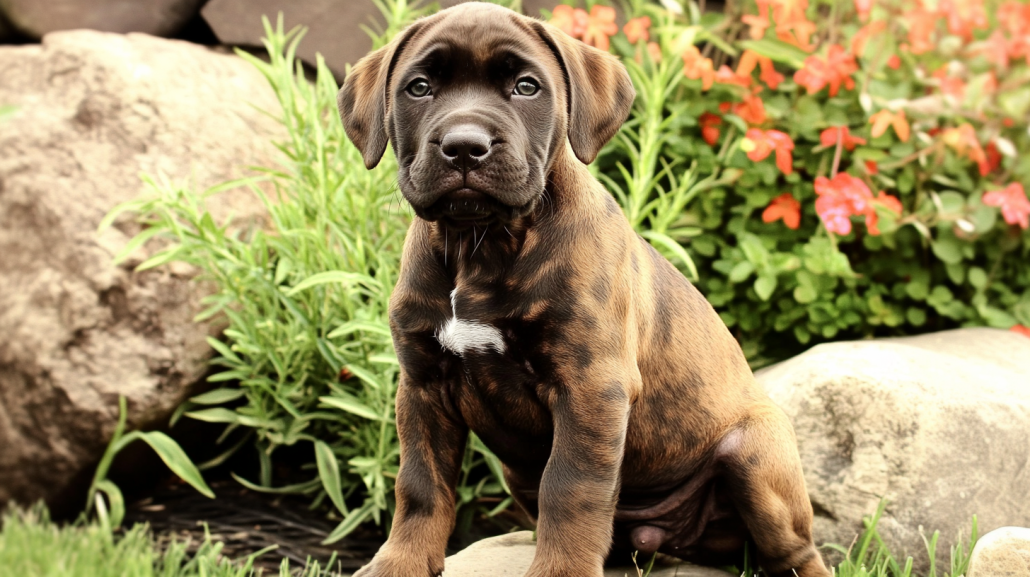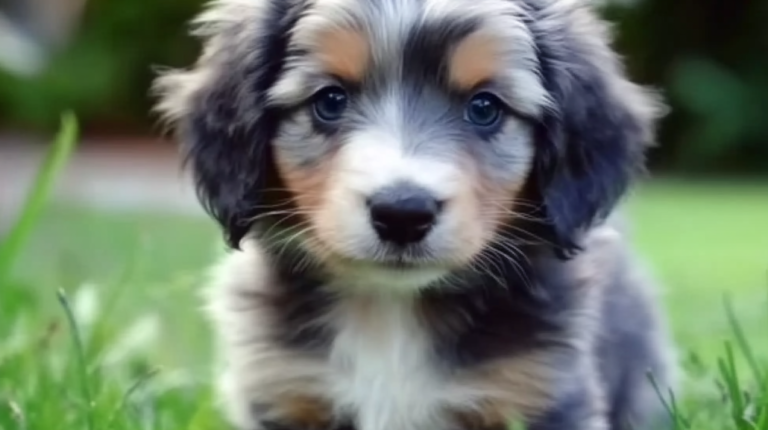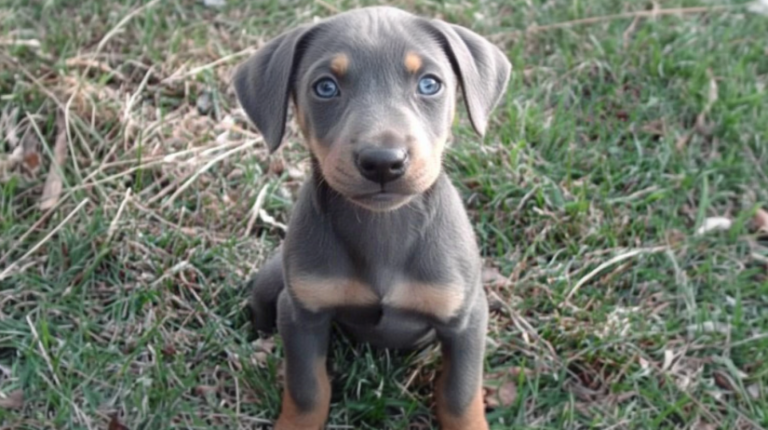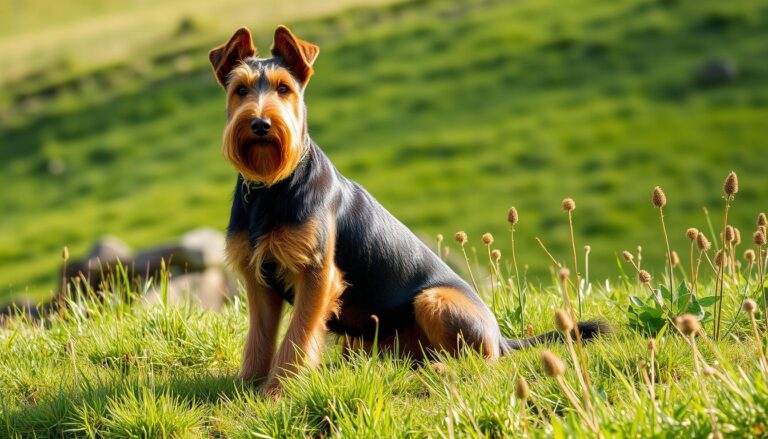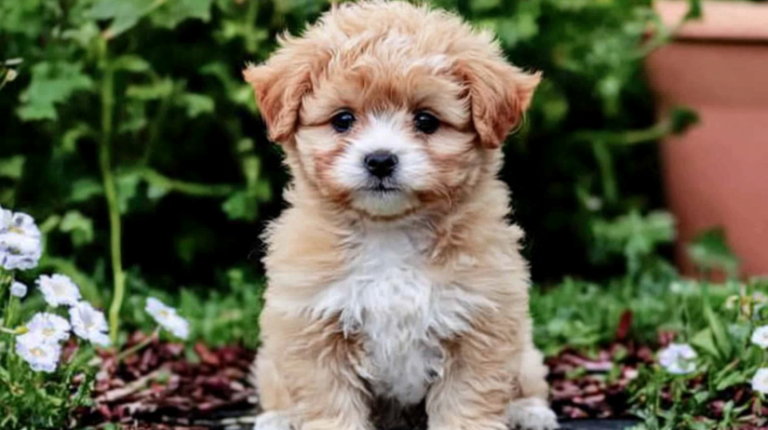Perro de Presa Canario Puppy: 7 Empowering & Positive Facts
Introduction
Picture a wide-eyed, curious perro de presa canario puppy padding around your living room, head tilting at every new sight and sound, all while showing glimmers of the protective instincts that make this breed so cherished. Owning a perro de presa canario puppy comes with both challenges and incredible rewards, from the early days of puppy antics to the proud moment you realize your dog has become an indispensable protector and friend.
Yet taking on the responsibility of a perro de presa canario puppy isn’t just about scooping up an adorable bundle of fur. These remarkable dogs need proper guidance from the start: structured training, appropriate exercise, and a nurturing environment that fosters both discipline and warmth. In this article, we’ll explore everything you need to know—from history and characteristics to the ins and outs of rearing a healthy perro de presa canario puppy—so you can determine if this majestic breed is a good fit for you.
A Short History of the Perro de Presa Canario
The perro de presa canario puppy has roots in the Canary Islands, a Spanish archipelago off the northwest coast of Africa. The breed is believed to be a cross between native island dogs called “Majorero” and Mastiff-type dogs brought over by Spanish conquistadors. Their formidable size and protective instincts made them invaluable guardians of farms and livestock, often working alongside their owners to ward off predators and intruders.
Over time, the Presa Canario became iconic within its homeland, recognized for its loyalty, strength, and courageous personality. Historical records from the region reveal that these dogs were so prized, they were often mentioned in official documents. Modern efforts by Spanish breed clubs and enthusiasts have helped preserve the perro de presa canario puppy lineage, ensuring that today’s dogs stay true to their proud heritage.
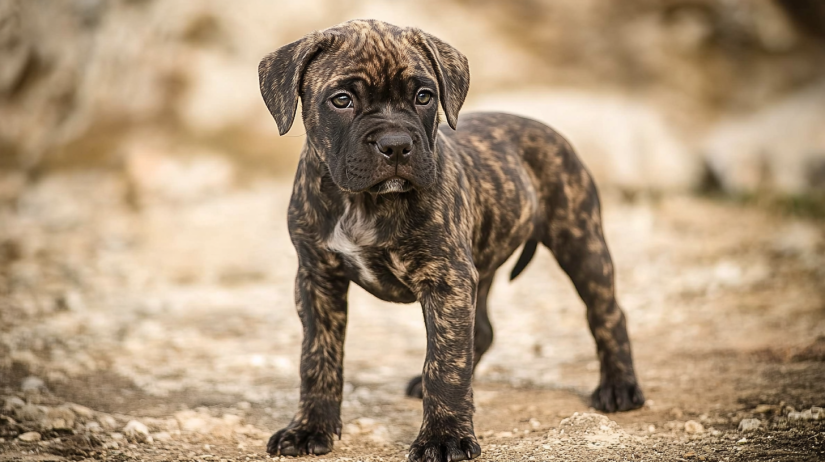
Key Characteristics of a Perro de Presa Canario Puppy
When considering a perro de presa canario puppy, understanding their defining qualities will guide you in providing optimal care:
- Size & Build
- Males can weigh 100–130 pounds, and females 80–110 pounds as adults.
- They have a muscular, rectangular build, with a broad, deep chest.
- Large head and powerful jaw, characteristic of Mastiff-like breeds.
- Temperament
- Loyal, protective, and territorial, making them excellent guard dogs.
- Calm yet alert; they observe new situations carefully before reacting.
- Early, consistent socialization is crucial to avoid aggressive or fearful behaviors.
- Energy Level
- While not as high-energy as some working breeds, the perro de presa canario puppy needs moderate daily exercise.
- Walks, structured play, and short training sessions keep them physically and mentally engaged.
- Intelligence & Trainability
- Highly intelligent, responding best to firm but fair, reward-based training methods.
- Can be headstrong, so owners must be consistent and confident.
- Life Expectancy
- On average, 9–11 years.
- Proper health care, a balanced diet, and a stable environment can extend that lifespan.
Choosing Your Perro de Presa Canario Puppy
Reputable Breeders vs. Adoption
- Breeders
A dedicated breeder will provide thorough documentation of a puppy’s lineage, health screenings, and early socialization efforts. They also offer support and guidance to ensure you’re ready to handle a perro de presa canario puppy. Always research the breeder’s reputation and visit their facilities if possible. - Rescues & Shelters
A rescue organization or shelter may occasionally have a perro de presa canario puppy or adult dog looking for a second chance. While purebred puppies in shelters can be less common, adult Presas are sometimes surrendered due to owners underestimating their care needs. Adoption can be a rewarding choice, and many rescue groups specialize in Mastiff-type breeds, offering you an alternative avenue to find a loyal companion.
Health Screenings & Documentation
Before bringing home a perro de presa canario puppy, ensure they’ve undergone necessary health checks—particularly for hip dysplasia, elbow dysplasia, and eye conditions. Reputable breeders will typically provide records from organizations like the Orthopedic Foundation for Animals (OFA). They can also inform you about the puppy’s vaccination schedule, deworming, and any genetic testing results.
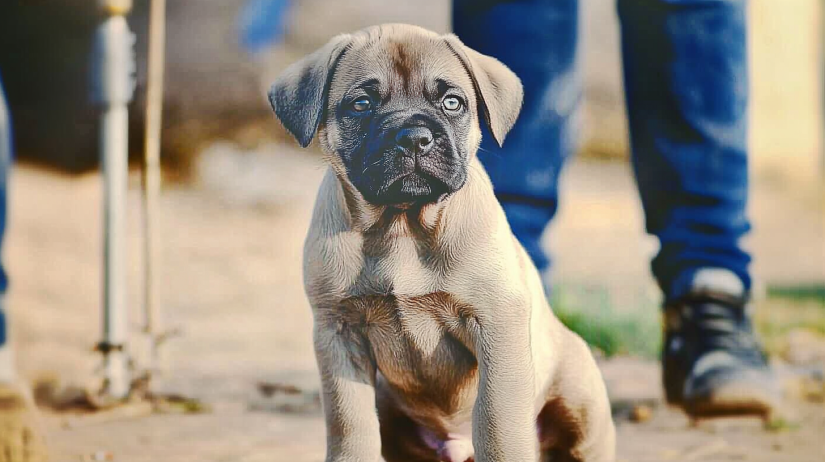
Puppy Temperament & Socialization
Ideally, a perro de presa canario puppy should exhibit curiosity and stability around humans and other animals at a young age. Watch how the puppy reacts to strangers: a healthy cautiousness might be present, but extreme fear or aggression can signal socialization issues. Spending time with the litter and the mother dog gives you insight into the puppy’s future behavior and helps you gauge if it’s the right fit for your household.
Bringing Your Perro de Presa Canario Puppy Home
Preparing Your Living Space
- Secure Outdoor Area: High fences (at least 6 feet) and sturdy gates are a must. Presas are agile and can climb or jump lower barriers.
- Puppy-Proofing Indoors: Remove toxic plants, secure electrical cords, and lock away household chemicals. This breed can be boisterous, especially during puppyhood.
- Crate & Bed: A crate offers a safe retreat for your perro de presa canario puppy and assists in house-training. Choose a durable crate sized for their expected adult weight.
Essential Puppy Supplies
- Sturdy Collar & Leash: Opt for high-quality materials designed for large breeds.
- Chew Toys: Helps redirect teething urges and prevents destructive chewing.
- Puppy Food: Consult with a veterinarian to select a balanced, large-breed puppy formula.
- Food & Water Bowls: Heavy, spill-proof bowls minimize mess.
- Grooming Tools: Include a soft-bristle brush or rubber curry comb for your puppy’s short coat, plus dog-safe shampoo and nail clippers.
First Days Home
Your perro de presa canario puppy might feel overwhelmed by a new environment. Ease them in by:
- Designating One Quiet Area: Let them explore a small, safe part of the house first, expanding access over time.
- Maintaining Routine: Set consistent schedules for mealtime, potty breaks, and bedtime.
- Introducing Family Members Slowly: Keep greetings low-key, especially if children are involved.
Training & Socialization Basics
Early Obedience Training
Begin training your perro de presa canario puppy as soon as they settle in:
- Positive Reinforcement: Praise and treats when they follow commands.
- Clear, Consistent Commands: Use the same words for “sit,” “stay,” or “down” to avoid confusion.
- Short Sessions: Puppies have limited focus. Train in bursts of 5–10 minutes multiple times a day.
Socializing with People & Pets
The protective nature of a perro de presa canario puppy underscores the importance of well-structured socialization:
- Invite Friends Over: Controlled introductions to trusted adults.
- Puppy Classes: Enroll in group classes to expose your puppy to new people, animals, and settings.
- Calm & Confident Handling: If your puppy senses your anxiety, they may interpret it as a threat and respond defensively.
Crate Training & Housebreaking
A crate provides a cozy den for your perro de presa canario puppy and simplifies potty training:
- Frequent Potty Breaks: Take your puppy outside often—first thing in the morning, after meals, and after naps.
- Praise Success: Reward your puppy for going potty in the correct location.
- Never Punish for Accidents: Instead, focus on spotting early signs like sniffing or circling, then guide the puppy outside.
Exercise & Play for a Perro de Presa Canario Puppy
Suitable Activities
Though not hyperactive, a perro de presa canario puppy still requires physical and mental engagement:
- Leash Walks: Gentle strolls or brisk walks help maintain a healthy weight and introduce the puppy to different sights and sounds.
- Indoor Games: Tug-of-war with a sturdy rope toy, hide-and-seek with treats.
- Puzzle Toys: Brain-boosting activities can help minimize destructive behavior.
Avoiding Overexertion
Large breed puppies, including a perro de presa canario puppy, are prone to joint issues if exercised excessively while their bones are still developing. Limit intense running and high-impact jumps in their first year. Instead, focus on balanced, shorter play sessions multiple times a day.
Health & Nutrition Essentials
A well-rounded approach to health is crucial for your perro de presa canario puppy to thrive. Regular checkups, a high-quality diet, and appropriate preventive care form the foundation of a long, healthy life.
Common Health Concerns
- Hip & Elbow Dysplasia
- Genetic conditions common in large breeds.
- Periodic x-rays and screenings can catch early signs.
- Maintaining a healthy weight and proper exercise routine helps reduce stress on joints.
- Gastric Dilatation-Volvulus (Bloat)
- Large-chested breeds are at risk for this life-threatening emergency.
- Feed smaller meals throughout the day and avoid vigorous exercise right after eating.
- Eye Issues
- Conditions like entropion (inward rolling eyelid) can occur in some lines.
- Regular vet checkups help detect problems before they worsen.
- Skin Allergies
- A perro de presa canario puppy may be sensitive to certain foods or environmental triggers.
- Watch for excessive itching, redness, or hot spots.
Ideal Diet for a Perro de Presa Canario Puppy
- High-Quality Puppy Food: Look for formulas specifically designed for large-breed puppies, balancing protein, fat, and crucial nutrients like calcium and phosphorus.
- Portion Control: Overfeeding can lead to rapid weight gain, placing undue strain on developing joints. Follow your vet’s feeding recommendations.
- Avoid Table Scraps: Human foods can be too high in fat, salt, or potentially harmful ingredients for a perro de presa canario puppy.
- Monitor Growth: Regular weigh-ins ensure your puppy grows at a steady pace, not too fast or too slow.
Grooming & Hygiene
Although the coat of a perro de presa canario puppy is relatively short, routine grooming supports good health and a strong bond:
- Weekly Brushing: Removes loose hair, promotes circulation, and reduces shedding around your home.
- Bathing: Once every few months or as needed. Over-bathing can dry out their skin, so use dog-specific shampoo.
- Nail Trimming: Overgrown nails can cause discomfort or lead to joint issues. Trim every 3–4 weeks or as necessary.
- Dental Care: Start a toothbrushing routine early to preserve healthy gums and teeth.
Table: Growth Milestones of a Perro de Presa Canario Puppy
Below is a general guideline of growth milestones for a perro de presa canario puppy. Individual development may vary, so always consult your veterinarian for personalized advice.
| Age (Months) | Approx. Weight Range (lbs) | Development Milestones |
|---|---|---|
| 2–3 | 15–25 | Transition to solid food; beginning of socialization |
| 4–5 | 30–50 | Teething stage; basic obedience commands introduced |
| 6–7 | 55–70 | Growth spurt; increased play intensity |
| 8–10 | 70–90 | Adolescence; continued muscle development |
| 11–12 | 85–110 | Near adult height; refining training and social behaviors |
| 13+ (months) | 90–130+ | Full adult size by around 18–24 months; mental maturity continues |
Note: Weights and developmental milestones are approximations and can differ based on genetics, diet, and environment.
The Importance of a Structured Lifestyle
Consistency in Rules & Boundaries
Your perro de presa canario puppy will flourish under a stable routine and consistent guidelines:
- House Rules: Decide early if they’re allowed on furniture, in certain rooms, etc.
- Feeding Schedule: Maintaining set meal times aids digestion and establishes structure.
- Daily Training: Integrating small obedience sessions keeps them mentally sharp and reaffirms your leadership.
Preventing Behavioral Issues
A bored or under-stimulated perro de presa canario puppy may bark excessively, chew inappropriately, or exhibit aggression toward strangers. Strategies to avoid these pitfalls include:
- Social Outings: Regular trips to dog-friendly parks or events—provided your vet approves—let your puppy safely interact with diverse environments.
- Mental Challenges: Puzzle feeders, advanced obedience tasks, or canine sports help burn mental energy.
- Professional Guidance: Don’t hesitate to consult a qualified dog trainer, especially if you’re new to large guardian breeds.
Real-Life Anecdotes and Success Stories
Case Study 1: Maggie the Gentle Giant
Maggie’s owner adopted her at 10 weeks old. Initially timid, Maggie’s perro de presa canario puppy instincts included watchfulness around new guests. Through puppy classes and controlled introductions, she gained confidence. By 18 months, Maggie became a balanced dog, friendly with the neighborhood kids yet protective of her property when strangers approached.
Case Study 2: Leo’s Behavior Revival
Leo, another perro de presa canario puppy, struggled with leash reactivity. His owners worked with a professional trainer, utilizing positive reinforcement and structured leash walks. Within a few months, Leo adapted to seeing other dogs calmly, proving that with patience and knowledge, challenging behaviors can be redirected successfully.
FAQs
Below are frequently asked questions centered around owning a perro de presa canario puppy.
Presa Canario price?
They range from $1,000 to $3,000 depending on breeder reputation and lineage. A perro de presa canario puppy from champion bloodlines or with health clearances can be pricier. Always prioritize ethical breeding and health over cost.
Do Presa Canarios need a lot of space?
Yes, they benefit from a secure yard and ample indoor room to move around. A perro de presa canario puppy grows quickly, requiring space for safe, controlled exercise. Apartment living is possible but requires extra commitment to walks and mental stimulation.
Are Presa Canarios aggressive?
They’re protective and can be wary of strangers, but aggression isn’t inherent if well-socialized. A perro de presa canario puppy that receives proper training and exposure usually grows into a confident, balanced adult. Owner commitment to positive discipline is key.
How challenging is training a Presa Canario?
They’re smart, yet can be stubborn if you’re inconsistent. A perro de presa canario puppy responds best to positive, firm leadership and rewards-based methods. Seek professional help if you’re a novice or face behavioral hurdles.
What’s the best diet for a Presa Canario puppy?
High-quality, large-breed puppy food supports slow, steady growth to protect joints. A perro de presa canario puppy should have balanced proteins, healthy fats, and controlled calcium. Consult a vet for personalized feeding guidelines.
Do they get along with children?
With early socialization and respect for boundaries, yes. A perro de presa canario puppy often bonds closely with family and can be gentle protectors. Supervise interactions to ensure safety on all sides.
Conclusion
Embracing the journey of raising a perro de presa canario puppy means welcoming a steadfast, confident guardian into your life. From the day your puppy first sniffs its new surroundings to the moment it matures into a watchful adult, consistency and compassion will be your most valuable tools. Although it takes commitment to shape a perro de presa canario puppy into a balanced, loving companion, the bond you’ll form can be truly extraordinary. If you’re ready to invest time, energy, and patience into your new best friend, you’ll discover that these powerful canines can offer unwavering loyalty and affection. Share your stories or thoughts in the comments below, and help others learn from your experiences with this remarkable breed!
For authoritative guidance on canine health, training, and adoption resources, you may find valuable information at the American Kennel Club (AKC), a reputable organization dedicated to responsible dog ownership and breed standards.

